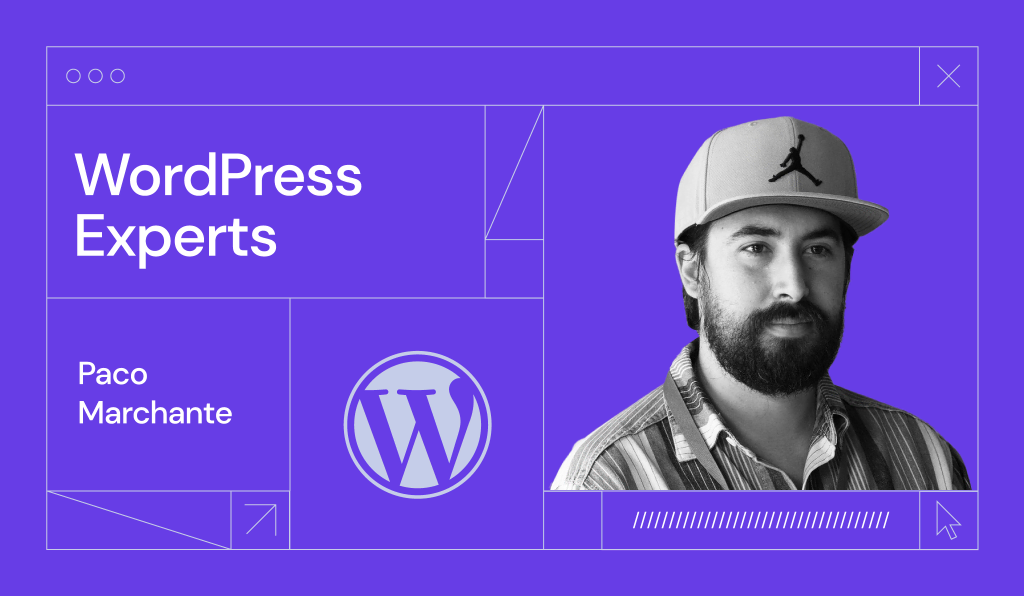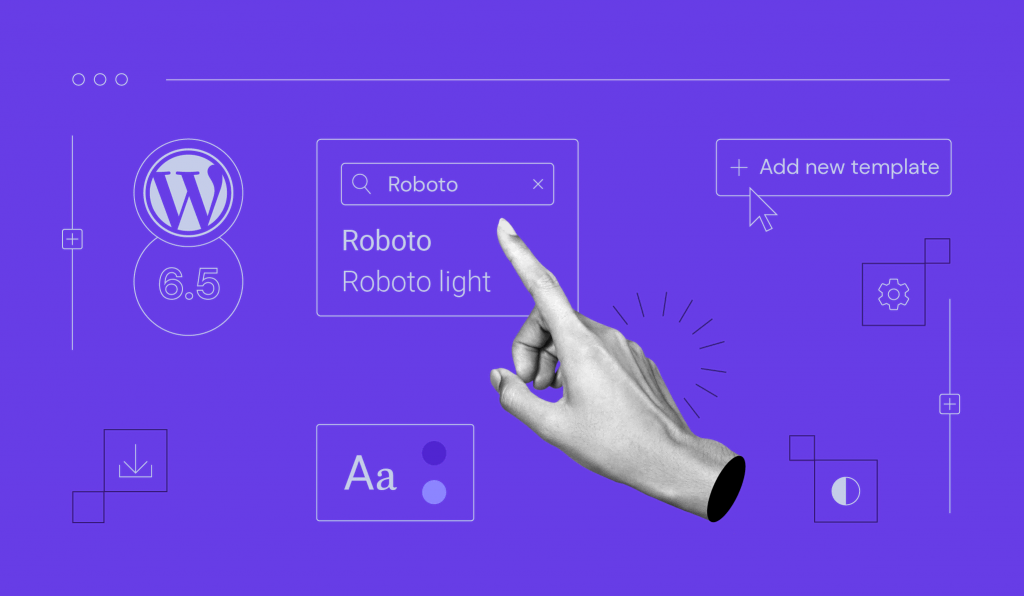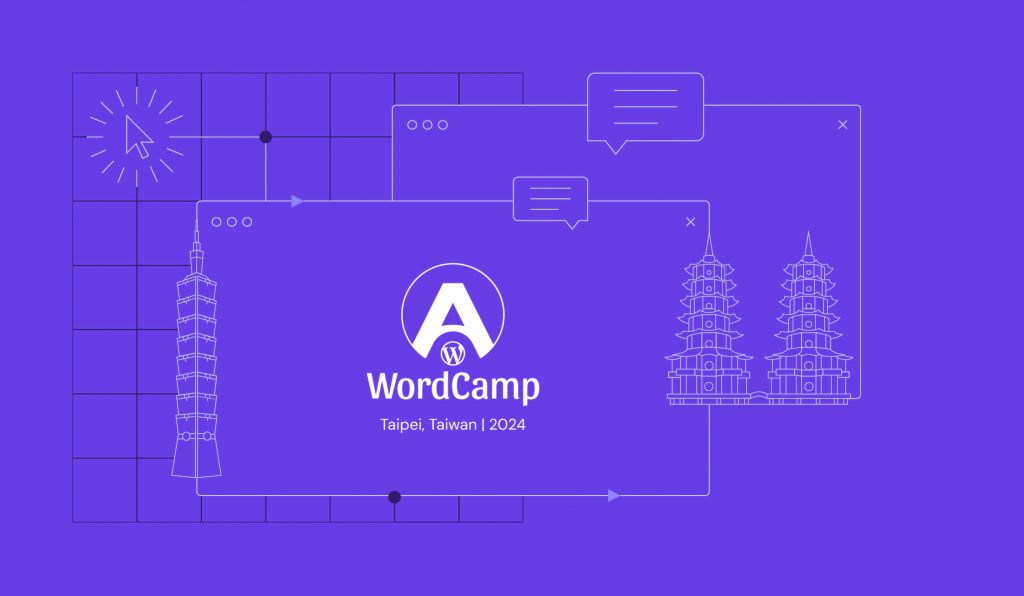Maggie Cabrera: Turning a WordPress Passion Into a Professional Pathway
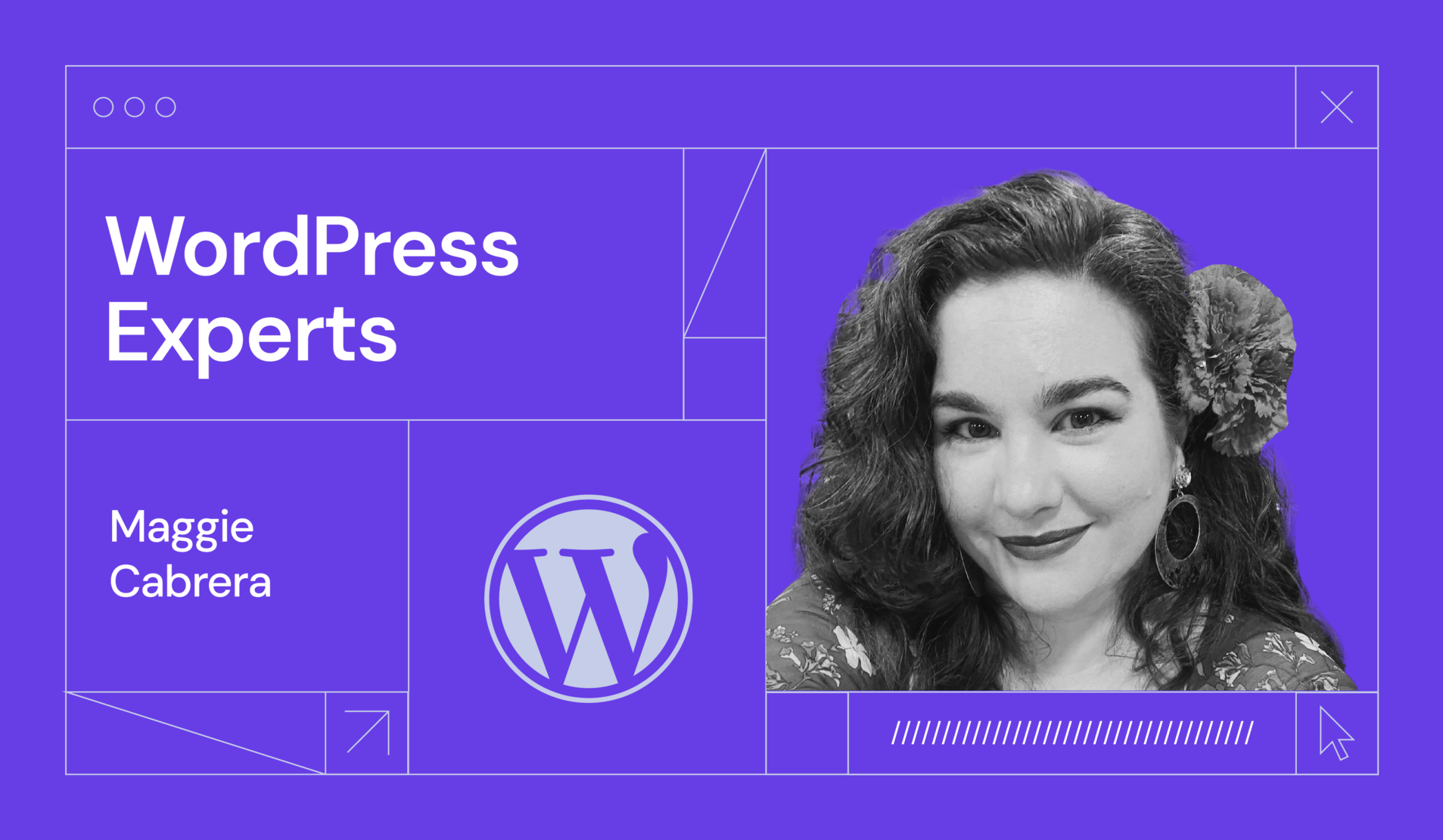
Maggie Cabrera is a JavaScript engineer at Automattic. She’s been working with WordPress for a long time, but has only been contributing to the open-source project since 2020. She mainly contributes to Themes and Core teams.
She was one of the release leads of WordPress 6.4, 2023’s final major release and an underrepresented gender-led one. Maggie led the Default Theme team, orchestrating the creation of the versatile Twenty Twenty-Four theme.
Maggie’s WordPress journey is evidence that a hobby can turn into a profession if done consistently. Read on to see how Maggie’s curiosity and love for blogging paved the way to a web development career.
From Personal Passions to Professional Pursuits
Back in 2007, when blogging started becoming popular, Maggie joined the wave and created her first blog on Blogger.
Yet, the limitations of the platform quickly became apparent. Frustrated by the inability to customize her blog, Maggie’s quest for creative freedom led her to WordPress. After purchasing a domain and a budget-friendly hosting service, she took her first steps into what would become a lifelong journey with WordPress.
Maggie then passionately tinkered with her online journal. Initially, she made basic modifications, such as changing the colors and fonts, and tweaking the CSS to alter aesthetics.
Driven by curiosity and a do-it-yourself ethos, Maggie immersed herself in the world of web customization by relying on Google and a hands-on approach to learning. During this exploratory phase, friends in software engineering provided inspiration and occasional advice for her.
A pivotal moment came when Maggie faced a crisis when studying architecture. Questioning her future, she reflected on her burgeoning interest in the digital domain. The internet, a significant part of her life since its beginning stages, seemed to offer a promising avenue.
“I really like my blog and all the things that I’m learning with it. And I’ve always been very fond of how the Internet worked. So I was like, ‘I think I want to work on this’,” Maggie says. This introspection led her to pursue a software analyst course in her home country, Spain. This move marked a formal shift towards her career in web development.
After finishing her course, Maggie worked for small companies that partnered with agencies. This became a fertile ground for practical experience, cementing her commitment to web-related projects.
From Maggie’s journey, we can see how continuously adapting and learning are key to getting to where she is right now.
Community Themes Initiative: Cultivating Creativity and Collaboration
In 2023, Maggie started an experimental endeavor within the WordPress community – the Community Themes Initiative.
The inception of this initiative traces back to insightful dialogues at WordCamp Europe 2022 in Porto, Portugal. “We discussed how every time we build a default theme, we get so many contributors working on it for this short period, and then everyone is gone,” Maggie says.
It sparked a realization that the process was not only crucial for technical advancement, but also an effective community-building exercise. It deserved continuity beyond the lifecycle of default themes. “The process is a great learning experience for everyone involved, so I want to keep this experience within the WordPress community,” she adds.
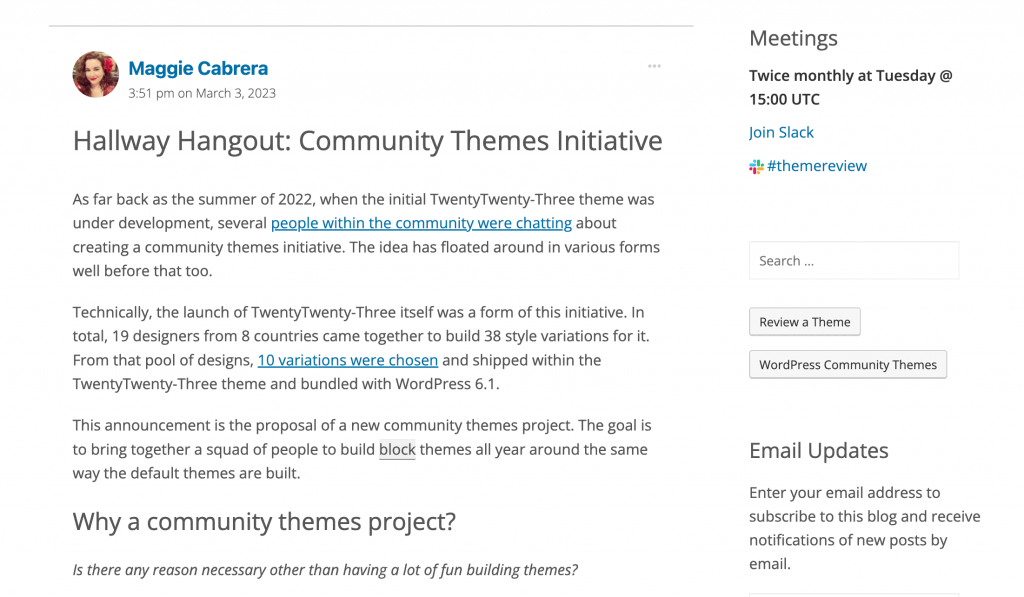
The Community Themes Initiative is Maggie’s answer to preserving and expanding this rich learning ecosystem. It sets a benchmark for the coding practice, offering a tangible reference for developers at all skill levels to learn from. “By looking at the code base, people can see that there are so many ways to build block themes,” Maggie emphasizes.
By doing this, Maggie aims to encourage people to create block themes. She aspires to enrich the WordPress theme repository with more high-quality block themes, diversifying the options available to users.
One of the achievements of this collaborative effort is the creation of Stacks, the first theme built by the WordPress community. It’s a simple slideshow-like theme that showcases the initiative’s ability to bring novel ideas to life.
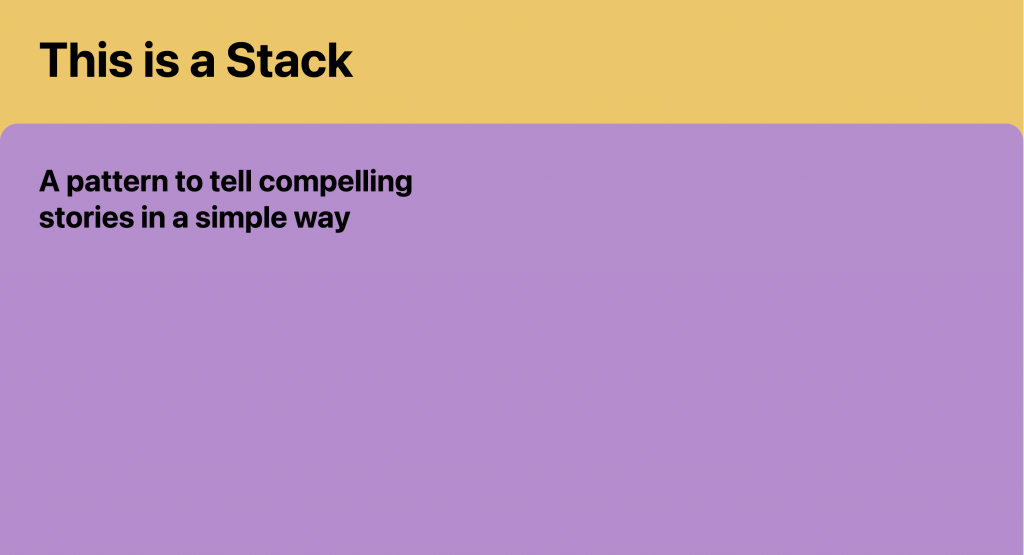
The Community Themes Initiative is more than just a project, it’s a movement toward democratizing theme development.
It invites participation in various forms – be it design, coding, or simply engaging in discussions. The initiative thrives on inclusivity, allowing individuals to contribute as much or as little as they prefer. It mirrors the collaborative spirit of the default theme development process, but with a more relaxed and welcoming approach, as there are no deadlines.
By fostering a space where learning, collaboration, and creativity intersect, Maggie’s initiative is not just about building themes. It’s a platform where anyone can learn the art of theme development at their own pace, supported by a network of peers.
This initiative stands as a beacon of continuous improvement and communal support within the WordPress ecosystem, keeping the spirit of innovation and collaboration alive.
Celebrating Community Spirit in WordPress
Since Maggie only became an active WordPress contributor in 2020, it makes sense that her first Wordcamp was the one that was held after the pandemic.
“It was my local WordCamp – WordCamp Sevilla 2021. It was the first in-person WordCamp after the pandemic. My local WordPress community is a very eager one and one of the most active in the world,” she reminisces. “We were still wearing masks… I think by then we were not distancing anymore. It was when everything started opening up again. But we were still weary and worried, so the event was still really small.”
Despite the small scale and the lingering caution of participants, the event was a heartfelt reunion. “Most of the talks were basically reminiscing of the days before the pandemic and all that. It was more socially oriented than technical,” Maggie says.
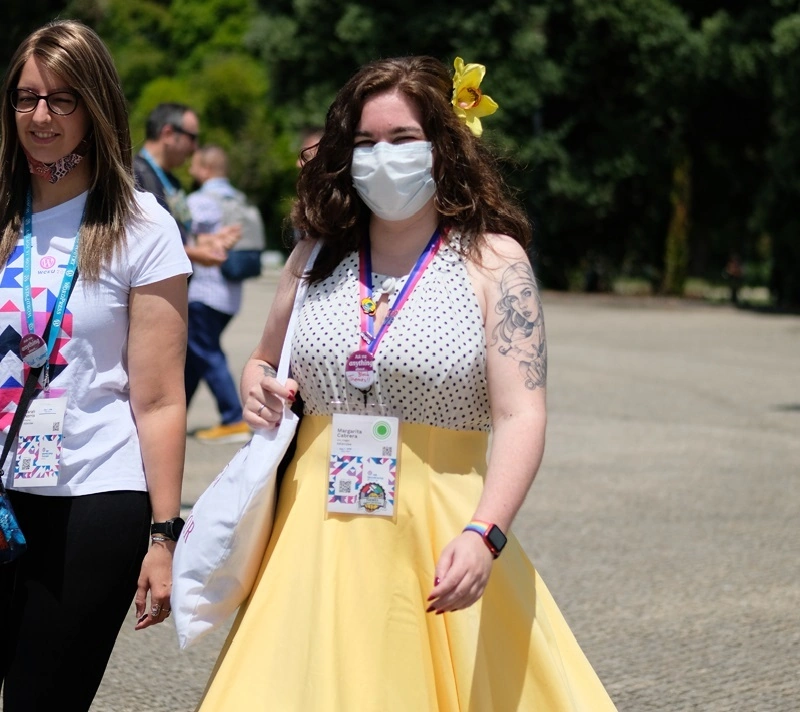
But WordCamp US 2023 stands out as Maggie’s most memorable WordCamp moment. It was there that the default theme was announced. “We worked very hard to make it possible for the participants to work on the theme during the Contributor Day, the first day it was announced,” she explains.
Maggie was so thrilled to see many people work on the theme that day. For her, the essence of WordCamps transcends the technical learning opportunities – it’s about the invaluable experience of meeting fellow contributors in person. The physical presence and direct interaction with those she had known only through online collaborations brought a new dimension to their relationships, enhancing the sense of community and shared purpose.
“I like the camaraderie when you’re at the (contribution) table. I was basically running around, “How are you doing? How are you doing? Do you need help?” That was really cool,” Maggie says, taking a trip down memory lane.
Addressing individuals looking to contribute to WordPress or tech in general, Maggie emphasizes the evolving nature of theme development, particularly with the advent of block themes. She encourages those from design backgrounds or with limited coding expertise to contribute to themes.
“I think there’s a shift of the people that are usually building themes. Before, theme-building was something that only developers would do, or designers who knew how to code to some extent. It’s different now. People who don’t know how to code can create block themes, too. The only thing that you need to know is how to use WordPress and the block editor,” Maggie explains. “People don’t know that there’s a possibility for them. People who are designers might do the design on Figma and expect someone else to pick that up and develop it. They don’t need to do that anymore. If they want, they can build everything themselves.”
Maggie sees this as one of the most important challenges that the WordPress community has – to let people know that the door is wide open for non-developers to make meaningful contributions.
She suggests starting by checking out the community themes GitHub repository, as it’s a great way to learn without any pressure.
Through initiatives like the Community Themes Initiative and nurturing supportive environments, Maggie aims to help demystify the process of theme development, inviting a new wave of creativity and participation from all corners of the WordPress community.
